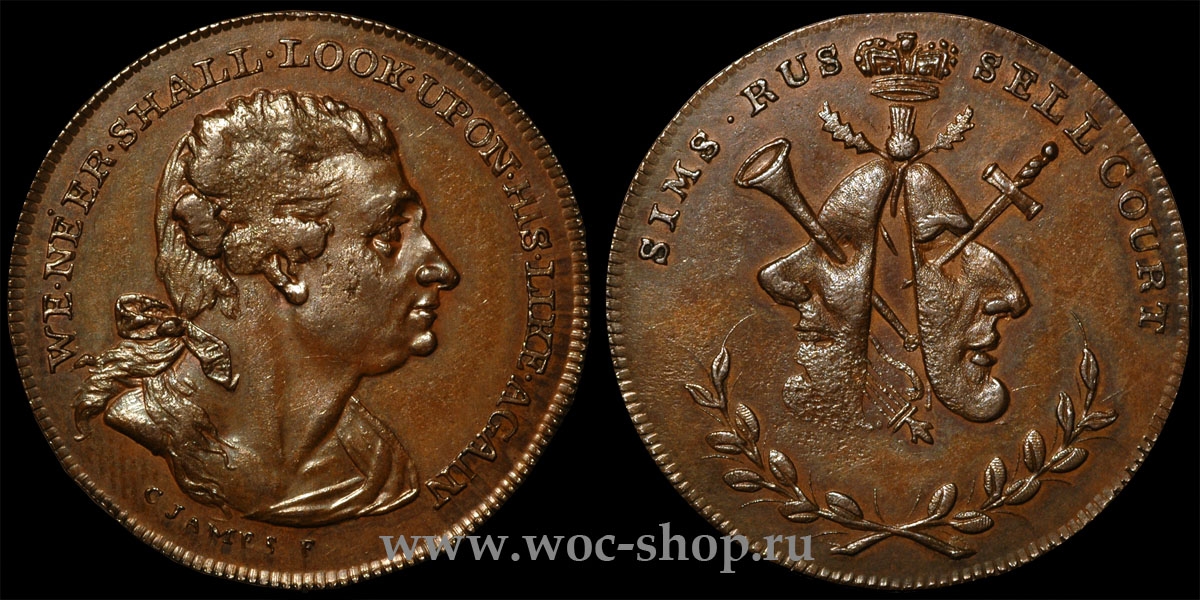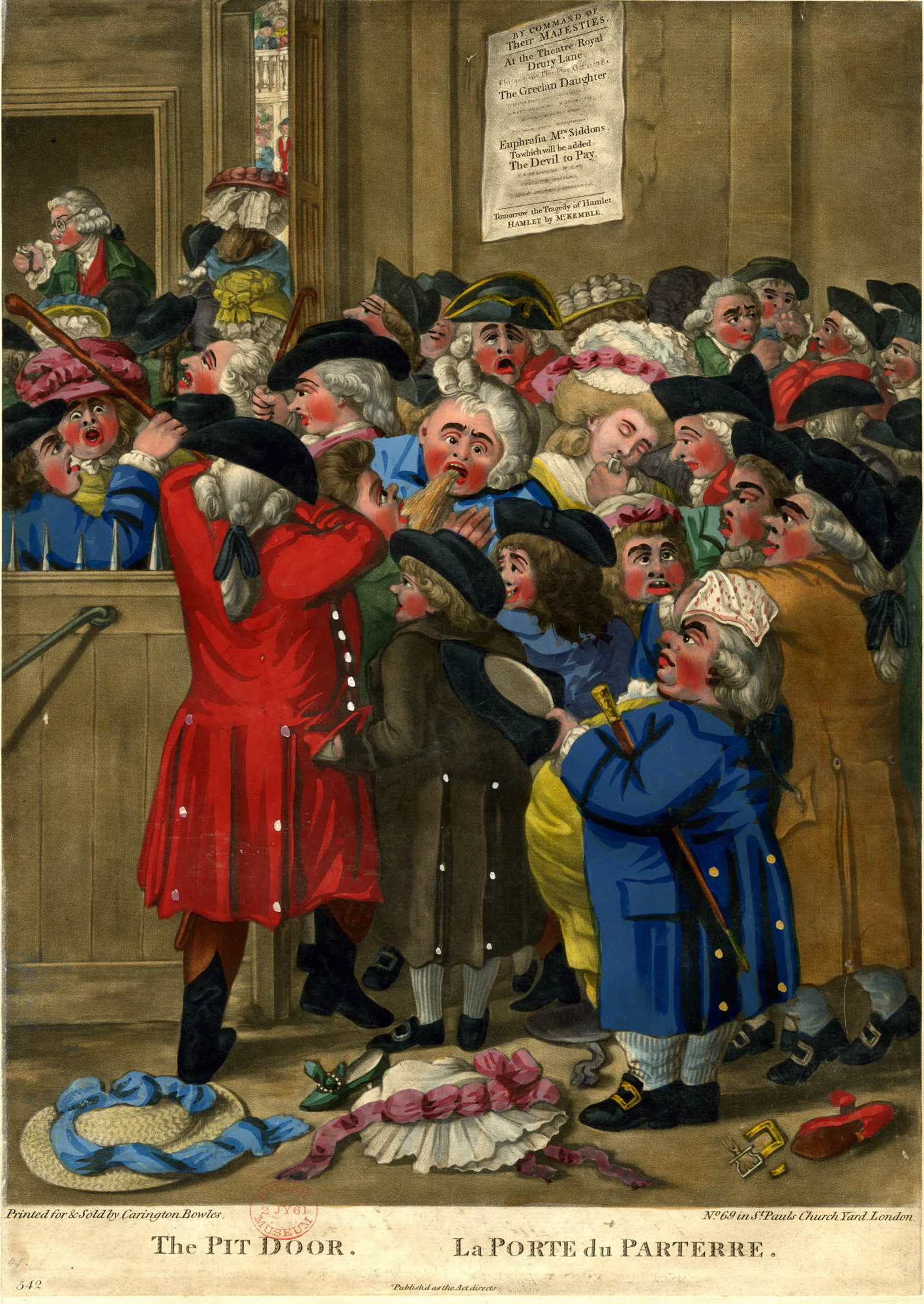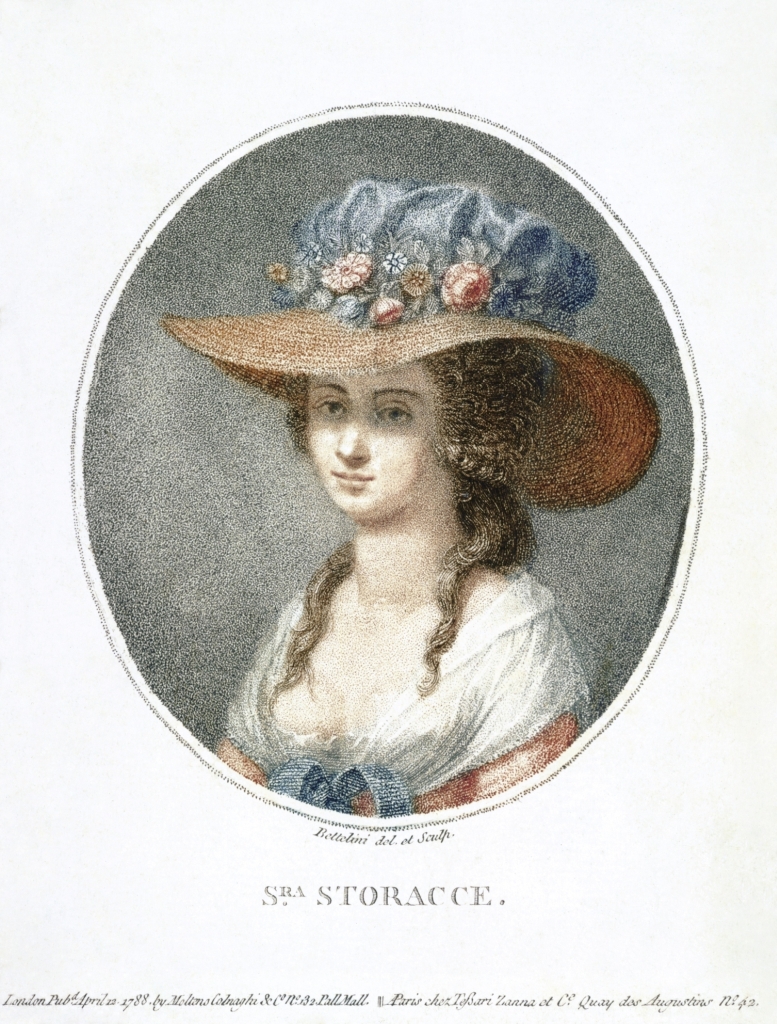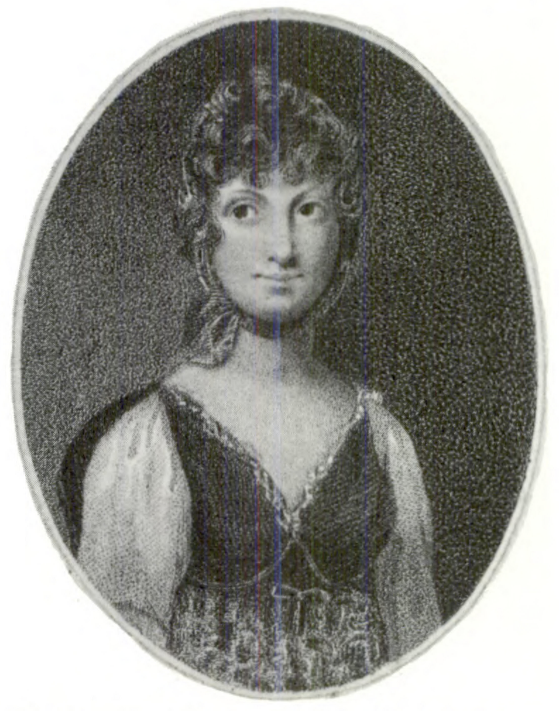
Online collections
monedastodas.com
All collections » Tokens » Unknown Mr. Sims
The token dedicated to the memory of the great actor David Garrick, whose bust is depicted on the front side, was issued by Mr. Sims, the owner of a pub on Russell Court in London. We know a lot about David Garrick, but what do we know about Mr Sims? In this article I will try to tell about it everything that I managed to find out.

George Sims (1748-1823) ran The Crown and Thistle on Russell Court, opposite the entrance to the Drury Lane Theatre. Mr. Sims was also a theatrical agent, having set up in his pub a kind of theatrical house of call *, frequented by actors, owners of small troupes and people in the theater community in general. The services of theatrical agents were used by novice or unemployed actors to find roles. Receiving an entry fee of seven shillings, this treacherous innkeeper amused short-sighted applicants by performing a trick, defiantly pocketing the silver, and, with the most businesslike ceremony, entered the name of the applicant in the book, indicating the desired dramaturgy.

Sims' business flourished for many years, and in order to pursue his own theatrical career, George turned the business over to his son William (1787-1841), who had a plaque in his honor in the living room of the aforementioned pub. There is no doubt that The Crown and Thistle pub changed its name to The Harp at the same time as the management changed. Notes and Queries for May 1872 states that The Harp pub on Russell Court has long been known as a haunt of poor and unclaimed actors. William, who continued his father's work until his death, was jokingly called "Sir William" in reference to the position of Lord Mayor. William Sims died on February 9, 1841 at the age of 54.
After transferring business to his
son, George took up his theatrical career, mainly in the provinces. Sims'
only appearance on the London stage was on October 15, 1792, when he gave his
own benefit performance as part of a replacement troupe, playing the part of
William from the "Province
Maiden" at the
Haymarket Theatre.
The Bristol Gazette, 12 August 1800,
mentions the marriage of George Sims, of Lillipur Alley, Bath, to Mrs. Clifford, "the
widow of the late Mr. Clifford of our theatre, and the daughter of Mr. Robins,
art-master". As
an actress, she performed on the stage of London and provincial theaters from
the age of 17, first as Miss Robins and then as Mrs Clifford. From
1805 to 1809, Mr. and Mrs. Sims performed together in a theater company in Bath
and Bristol, where George played minor comic characters.
In addition to his son, Sims had a
daughter, Sarah, who was also an actress, singer and dancer and gained more fame
than her father. It is not known for certain when Sarah was born,
but already at the age of four she discovered a taste and talent for music,
which her father decided to support. Sarah first appeared in public
at the London theater of Sadler's Wells: in the melodrama The Magicians ,
in which she played the role of Harriet on September 26, 1796, and in the
musical play Sadaq
and Calasrad ,
in which in 1797 she played the role of Kodan. When she first
performed at Covent Garden on 20 October 1797, the
Monthly Mirror reported:
"The Mill Girl" was shortened to a
farce to present the young lady as Fanny, with new songs adapted to her voice
range, which has a very idiosyncratic character.
It was a full tenor, something like Mrs.
Kennedy, producing a similar effect. Few women have had such a
timbre, so we must appreciate it.
The main strength lies in the low notes,
which in Miss Sims are round, deep and roomy. For us, they
practically did not differ from the sound of the tones of Madame Storace. If
the musicians find it worth it to compose for her, she will quickly achieve
success as a singer if her wagon is in order, which we now rather doubt.
 Madame
Storace is a British singer of Italian origin Anna Selina Storace (1765-1817),
also known as Nancy Storace, with a soprano voice. She was the
first performer of the part of Susanna in Le nozze di Figaro, written by Mozart
especially for her.
Madame
Storace is a British singer of Italian origin Anna Selina Storace (1765-1817),
also known as Nancy Storace, with a soprano voice. She was the
first performer of the part of Susanna in Le nozze di Figaro, written by Mozart
especially for her.  Portrait
of Sarah Sims as Fanny in The Mill Girl. Engraved by Aleys after
Foster and published by Roach on folio in The Genuine Memoirs of the Green Room
in 1806.
Portrait
of Sarah Sims as Fanny in The Mill Girl. Engraved by Aleys after
Foster and published by Roach on folio in The Genuine Memoirs of the Green Room
in 1806.After her debut as
Fanny, she was received with endless applause and took a place in the main
company, continuing to perform at Covent Garden and Sadler's Wells.
Thomas Dutton's weekly theatrical
publication Dramatic Censor reported in 1800: "Miss
Sims is on her way to success. Her incarnation of the young Edward
was overwhelmed with feelings. Without a doubt, over time, her name
will be included in the list of the main performers of the theater. It
remains only to wish for more development of her musical talents.”
Success on the London stage paved the way
for her to conquer the provinces. In the summer season of 1798 she
first appeared on the stage in Birmingham, and later in Liverpool and Bristol. Surviving
company listings at the British Library and Folder's Library show that she was
paid £3 a week in 1799-1800, £4 in 1800-1 and £5 in 1801-2.
It is clear that her maiden name was of
professional value to her, as she used it on posters for several seasons after
her marriage to provincial musician William Penson on 26 August 1804 at St
Nicholas' Church in Liverpool. He was bandleader at the Theater
Royal in Edinburgh from 1810 to 1816, where Sarah performed for nine seasons
until 1816.
By her twenties acting career, Sarah Sims
Penson had at least 160 roles in her repertoire that ranged from pantomime and
comic opera to slapstick and comedies of manners - such roles as Leonora in "Two
Arrows for Your Bow", Fanny in "Girl with
windmill ,
Nerissa in The
Merchant of Venice ,
Miss Leeson in The
School for Wives ,
Zekiel Homespoon in The
Heir by Right, and
Couslip in A
Pleasant Surprise . She
first played on stage such characters as: Connor in Kross's panomime "The
Round Tower" ,
Edwin in the pantomime "Jeanne
d'Arc" , Agra in
James Cobb's comic opera "Rama
Friend" , Mary
in a musical farcePaul and
Virginia , Nancy
in Thomas John Dibdin's musical interlude The
Naval Prop ,
Tufflin in the musical farce Saint
David's Day , Ozora in the Hermione interlude
, and Peggy in Thomas Knight's comic opera Turnpike
Gate . An
analysis of her roles in her early years shows how much her success depended on
a good voice and a graceful figure, as well as on an unusually short stature,
which allowed her to play the roles of pages and teenage boys even after
adulthood (Prince Edward in Richard III, Paul in Paul and
Virginia ,
William in Rosinaetc.). Forms
and soft parts were her forte due to her surprisingly cheerful and lively
disposition. Over time, Sarah's talents became brighter. An
extensive record of her roles at the Edinburgh Theatre, where she was popular
for more than a decade, shows that although she moved on to more mature roles
such as Mrs. Candor in The School for Scandal, she was able to retain much of her former
animated roles while performing in new roles. roles.
The British Museum's music catalog lists
four songs performed by Sarah Sims at Vauxhall.
A handwritten document of unknown provenance from the Folger Library mentions Mr. Sims, a theatrical agent, who died on September 19, 1823, at the age of 75.
*House of conscription - a place, usually a pub or tavern, where apprentices associated with a particular profession gather after hours, ready to be hired by employers.
Performances mentioned in the article:
The Country Girl is a comedy in five acts, in the interpretation of David Garrick's comedy The Country Girl by the English playwright William Wycherley (William Wycherley 1640-1716).
Melodrama "Magicians"
Musical performance "Sadaq and Kalasrad" based on the fairy tale of the same name from the collection of the English writer James Ridley (1736-1765) (under the pseudonym Charles Morell) "Tales of the Spirits, or Amusing Instructions of Goram, the son of Asmarov"
The comedy play The Mill Girl was written by the English playwright John Fletcher (1579-1625) and William Rowley (1585-1626) in 1623.
Comedy "Two Arrows for Your Bow" by Irish playwright and poet Robert Jephson (1736-1803)
Comedy play "The Merchant of Venice" by William Shakespeare (1564-1616)
Comedy School for Wives by Irish playwright and poet Kelly Hugh (1739-1777)
The comedy "Heir by Right" was written by the English playwright George Colman Jr. (1762-1836) in 1797.
Comic opera A Pleasant Surprise to music by the English composer Samuel Arnold (1740-1802) based on a libretto by the Irish actor and playwright John O'Keeffe (1747-1833) .
Pantomime "The Round Tower" by James Rarwright Cross
Pantomime "Jeanne d'Arc" .
Comic opera "Rama Friend" by the English librettist James Cobb (1756-1818) .
Musical comedy "Paul and Virginia" .
Musical interlude "Naval Prop" by English playwright and songwriter Thomas John Dibdin (1771-1841) .
Musical comedy Saint David's Day .
Interlude "Hermione" .
Comic opera "Turnpike Gate" by Thomas Knight .
Literature:
A Biographical Dictionary of
actors, Actress, Musicians, Managers & Other Stage Personnel in London
1660-1800, Philip H. Highfill, Kalman A. Burnim, Edward A. Langhans SIU Press,
1973 .
Lives of the most celebrated Actors
and Actresses, etc. Thomas Marshall (Dramatic Writer), 1848 .